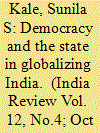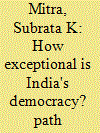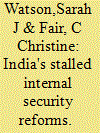|
|
|
Sort Order |
|
|
|
Items / Page
|
|
|
|
|
|
|
| Srl | Item |
| 1 |
ID:
125908


|
|
|
|
|
| Publication |
2013.
|
| Summary/Abstract |
This article undertakes an empirical test of the proposition that natural disasters increase the risk of violent conflict. Climate change is expected to increase the risk of natural disasters, and India has been pointed to as being particularly at risk. State-level data from India for the period 1956-2002 are used to assess quantitatively whether climate-related natural disasters in India have contributed to increased rates of riots and politically motivated violence. The results indicate that disasters increase the risk of riots where literacy levels are high, and politically motivated violence where literacy levels are low. However, although statistically significant, the effect in both cases is so weak that it requires exceptional circumstances for disasters to have any substantially important impact.
|
|
|
|
|
|
|
|
|
|
|
|
|
|
|
|
| 2 |
ID:
125907


|
|
|
|
|
| Publication |
2013.
|
| Summary/Abstract |
How are the contours and practices of the state changing under the regime of economicliberalization in India? To address these questions in the context of India, in this essay I turn to the relatively understudied state of Odisha. The most common sites of research about the political economy of globalization in India are the technology clusters around Delhi, Bangalore, and Chennai, and the dynamic spaces of the burgeoning service sector. By analyzing politics in globalizing Odisha, however, we get a different sense of the messy, complicated, and sometimes contradictory politics of globalization in India, as well as how the state is adapting to these changes. The relative success of Odisha in attracting investments in mining and mining-related sectors is due both to the opening of the Indian market generally as well as efforts by the state government to promote industrial investment in these sectors.
|
|
|
|
|
|
|
|
|
|
|
|
|
|
|
|
| 3 |
ID:
125906


|
|
|
|
|
| Publication |
2013.
|
| Summary/Abstract |
India in 1947 faced the challenge of transforming a poor, socially and spatially fragmented country with low literacy and violent memories of Partition to a democratic state and a cohesive nation. Though the country sorely lacked the "pre-conditions of democracy," it still made a successful transition to electoral democracy, and went on to consolidate it. Compared to other South Asian nations, India's democracy appears even more puzzling-common origin from British colonial rule has led to dissimilar outcomes among India's neighbors. I argue in this article that India's democracy is neither a sham nor idiosyncratic. India's transition to democracy is the outcome of general variables such as path dependency, adroit institutional arrangements, strategic policy reform, and political capital. India's democracy conflates Western liberal democratic forms and non-Western cultures, leading to enfranchisement, entitlement and empowerment of the citizens, and the creation of a sense of efficacy, social justice, legitimacy and trust among them.
|
|
|
|
|
|
|
|
|
|
|
|
|
|
|
|
| 4 |
ID:
125909


|
|
|
|
|
| Publication |
2013.
|
| Summary/Abstract |
Following the 2008 terrorist attack on Mumbai-an attack which had been amply foreshadowed by intelligence and previous, similar strikes-India's government promised unprecedented reforms to the nation's internal security architecture. Five years after Mumbai however, these reforms have almost completely failed to bear fruit. This article reviews both the reasons that the Mumbai attacks had such an impact within India's politics and also why the promised reforms were never able to take shape. It argues that the high-profile nature of the Mumbai attacks, and their effect on India's economic elite, forced the central government to respond. But India's states are so adamantly opposed to the loss of autonomy, particularly over their police forces, that substantive security reform would entail. Thus the prospects for effective reform in the foreseeable future are dim.
|
|
|
|
|
|
|
|
|
|
|
|
|
|
|
|
|
|
|
|
|